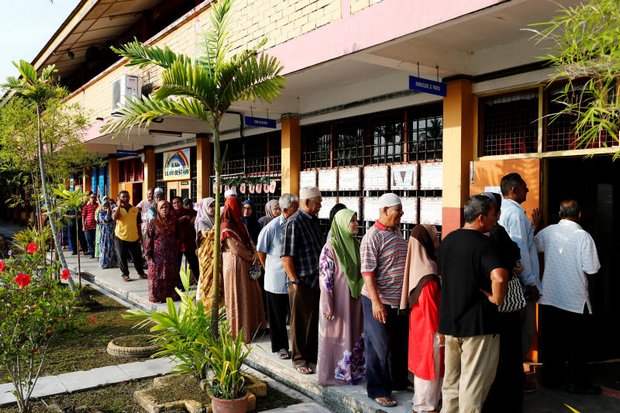
Southeast Asia has been a hotbed of issues that are not democratic in nature, but Wednesday's outpouring of Malaysia voters, showing their frustration by voting out a government accused of massive corruption, has shown a path for other nations to follow.
Voters in Malaysia went out in droves to cast their ballots and seek change in a country plagued with political problems since the 1Malaysia Development Bhd (1MDB) scandal erupted, leaving a black mark on the governance of the United Malays National Organisation (Umno), a party that has ruled the country since independence in 1957.
The opposition contested the elections under a single banner of Pakatan Harapan (Alliance of Hope) and won 121 of the 222 seats needed to form a government, while outgoing Prime Minister Najib Razak's Barisan Nasional (National Front) party got 79 seats, with the remaining seats going to the Malaysian Islamic Party (PAS).

Umesh Pandey is Editor, Bangkok Post.
Mr Najib, who has been accused of personally benefiting from 1MDB to the tune of US$681 million in his personal accounts, came out to accept the "will of the people" but failed to immediately step down. The US Justice Department has said that as much as $4.5 billion was looted from 1MDB between 2009 and 2014.
In his speech, Mr Najib said that there was no fraud at the polls and that his party had done its best, but he left the door open to the possibility of forming a government when he said that "no single party has won the mandate" and that the king would be the one to decide who the next prime minister will be.
This statement dangles the prospect of horse-trading by the outgoing Umno to try and tempt some of the smaller parties that make up Mahathir Mohamad's Pakatan Harapan to switch sides and possibly bring Mr Najib back.
Malaysians, their Asean peers and the world continue to hold their breath over what decision the monarch will make in the next 24-36 hours. Will Dr Mahathir return to continue the story of his 21 years of iron-fisted rule, or will Umno find a way to circumvent the wishes of the people and force its way back to power?
In any case, the Malaysian election of 2018 has taught a good lesson to those Asean members for which democracy is considered just a means to an end.
Democracy in Asean has been next to non-existent. The region has been a playground for the rich and powerful. Up until Thursday morning's official announcement of the surprise election victory by Pakatan Harapan in Malaysia, the only countries that had true democracy were Indonesia, Myanmar and the Philippines.
Even among those democracies, Myanmar and the Philippines have had their issues. Myanmar is suppressing freedom of speech with a crackdown on journalists who are doing their job by shedding light on the government's handling of the Rohingya crisis.
The Philippines, meanwhile, has a quasi-dictator as its president who does not care about human rights or freedom of speech, be it for citizens or the media.
The remaining seven countries in the region are either toying with democracy or have been totally immune to that word. Both Singapore and Cambodia claim to be democracies, but both suppress opposition -- one more so than the other, but there is suppression taking place nonetheless.
After so many years of seemingly invincible single-party rule, the Malaysian population came out and showed what each of their votes meant. Some Malaysians living in Thailand actually flew down to cast their ballots, and when asked why they were undertaking such an effort their answer was simple: "To save my country."
That was the degree of frustration that many Malaysians felt, and the result is that the coalition now has support from 135 of the 222 members of parliament. The 135 seats were won despite the use of every possible means to intimidate Pakatan Harapan and its supporters, be it through recently passed laws that could get one in trouble for spreading "fake news", or many other such laws passed by the Najib government to muzzle the flow of information.
Unlike Thailand, where the army usually steps in to put an end to "corruption", the Malaysian military did not come out to topple the Najib government, nor did demonstrators in various shirt colours take to the streets to seize the finance ministry or government complexes to paralyse the corrupt Najib government -- a method that has frequently been used in Thailand since the early 2000s.
Some colour-coded protests did take place in Malaysia a few years ago, but they fizzled out. Every dissatisfied citizen of Malaysia opted to use his or her right to teach the corrupt government a lesson and vote for change, a change that they themselves don't know how will shape up, because the country has never seen a proper transition of power since gaining its independence from Britain.
The victory of Dr Mahathir and Pakatan Harapan therefore stands as a testament to the fact that democracy could be a solution to a nation's problems, and that if a government is really corrupt the voters will eventually decide on a change when the time is right. It may have taken Malaysia 61 years to undertake that change, but in historical terms six decades are just a blip.
Malaysia is not the first and only example of how corrupt governments are overthrown by voters, but it is the closest example to Thailand, and therefore the people of Thailand and Asean can learn a good lesson about the value of democracy and voters' rights, which in turn can help shape the future of their own countries.
